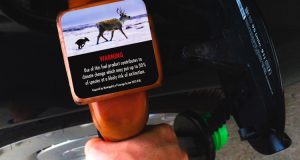By Sarah Jane Attardo
It was an early October weekend when I scurried outside with my jacket in hand heading towards the closest Starbucks to acquire my coveted seasonal beverage – a pumpkin spice latte. While in line, a sudden realization dawned upon me: it was a very agreeable 18°C outdoors and yet here we were, all so excited for the upcoming change of weather. The fact that I was waiting for a warm pumpkin-flavoured coffee while it was still hot enough to wear shorts and a t-shirt is an image I struggle to comprehend.
What Are You Doing, Weather?
Normally, in the span of the summer months, Toronto will experience on average 13-14 days above 30 degrees Celsius. Last year, however, there were 38. It is understandable, then, that my immediate focus was on the sheer bliss I felt from not having to brave yet another downpour sans umbrella to purchase my long-awaited latte. Despite this minor victory, it was mildly unsettling that every time the weather forecast appeared, projected highs were more characteristic of early July.
Climate Change: The Sneaky Aggressor
It is sad that our attention is geared towards our caffeine fix but not our individualized contributions to climate change. To some extent, we all have diffused responsibility for utilizing fossil fuels. We think that our small amount of fossil fuel consumption is insignificant in light of the “greater” problem of industrial use of oil and gas.
Going, Going, Gone Away with Divestment
350.org and GoFossilFree have campaigns that encourage companies and schools to engage in divestment strategies whereby your employer or educational institution stop contributing finances to major fossil fuel companies. However, this does not truly address the problem of fossil fuels contributing to climate change and greenhouse gases. Divestment is not optimal since some institutions do not have any moral qualms against investing in the fossil fuel sector. Consequently, some investors simply refuse to divest because of the prisoner’s dilemma whereby there are options available that result in hurting everyone regardless of the choice selected. Divestment strategies do not change how much we rely on gasoline for everyday life, especially to fuel our most desirable means of transportation – automobiles. Collectively, we are contributing significantly to these climatic changes with each stop we make at a gas station to fuel up. We must try to abate our thirst for gasoline in innovative ways to negate the side effects of our fossil fuel consumption.
People, It’s Time for Some Disruption!
Our Horizon, the not-for-profit organization I am placed at, is addressing this issue of disrupting our fossil fuel narrative as a means to mitigate climate change. The organization’s work is used as a tool to prompt us out of the complacency of everyday gas refills by placing warning labels on gas pump nozzles. By advocating and lobbying from coast to coast in Canada, Our Horizon’s mission is to get municipalities to utilize their legislative authority to enact by-laws that place
our fossil fuel narrative as a means to mitigate climate change. The organization’s work is used as a tool to prompt us out of the complacency of everyday gas refills by placing warning labels on gas pump nozzles. By advocating and lobbying from coast to coast in Canada, Our Horizon’s mission is to get municipalities to utilize their legislative authority to enact by-laws that place
warning labels on gas pumps. Using municipal law is a great tool that raises awareness of climate change, with its faraway impacts, and brings it to the forefront of our daily lives each time we want to use our purchasing power to emit more exhaust. By engaging with a warning-labelled product at the gas station, where the label states that the fuel product about to be consumed contributes to the degradation of the environment is an effective and cost-efficient method for municipalities to exercise authority within their jurisdiction.
Ontario’s Ministry of the Environment and Climate Change has issued its Climate Change Action Plan that speaks to the ways the provincial government plans to implement a cap and trade system that will enable a low-carbon economy to prosper. However, this plan targets only 82% of the industry causes, not the individual contributions. Therefore, innovative approaches such as municipal regulations implementing warning labels on gas pumps can be used in handling climate change to ensure that the gap in addressing individual consumer concerns are met.
Climate change sneaks up on us just like pumpkin spice lattes. We are aware that it is something that we will deal with but not until it is right before us does it become tangible. A seasonal delight misplaced in the “wrong” seasonal climate… or perhaps scarily the new “normal” Autumn temperatures?



